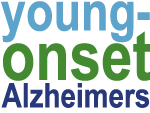Do you have a loved one who seems too young to be experiencing confusion and memory loss?
Today there are millions of Americans who have some form of dementia. Hundreds of thousands of them would be considered “younger.”
Generally, young-onset dementia (often called early-onset) refers to those who are diagnosed with dementia before the age of 65. While dementia at any age is tragic, these younger families carry an extra burden. A person with young-onset dementia will tend to lose their job and driver’s license well before they turn 70. They’ll lose earning potential, sometimes have dependent children to care for, a mortgage to pay, and even elderly parents to look after. The younger person with dementia may be in the prime of their career, beginning to plan for retirement, and be physically active and in excellent health otherwise. It can be very difficult to balance this while experiencing gradual and steady cognitive decline.
Do you struggle to do it all?

Help Me Sing My Song: Stories of Young-Onset Dementia seeks to help by sharing stories of how others have dealt with similar challenges:
“
Looking back, I received more than I gave during this journey.
”
– Jane’s friend & care partner
“
My memories are in a box. Resting.
”
– Louise
“
I felt like I was always running to catch up and being slapped upside the head the whole time, in shock.
”
– Robin, Joe’s wife
“
Isn’t there some other way we can make this work?
”
– Tom
“
“Here she is. This is my mom. Take her just as she is.”
”
– Kate, Susan’s Daughter
“
Take trips to restore your soul.
”
– Melodie, Scott’s wife
They may be:
- Still parenting young children
- Working, or struggling to understand what happened after being laid off
- Physically active and engaged in many different activities
- Still creating their financial nest egg
All that means a tragic juggling act for the people who support them. And, yet, there are few resources focusing on this younger population.
Help Me Sing My Song shares stories from other caregivers on what worked for them and what didn’t. You are not alone. We hope these stories will inspire you and encourage you to come up with creative caregiving ideas of your own.
About the Authors
Barbara Lewis’s husband Steve received the diagnosis of young-onset Alzheimer’s or young-onset dementia, when they were in their 50s. He had been forced to retire while she was working full time, taking care of all the household duties, raising their daughter and doing her very best to care for Steve. Mary Archer had created a dementia care business which was specifically designed for people like Steve. He became one of the very first people to join Mary’s program.
Barbara and Mary know first-hand and close-up what it means to care for someone who develops Alzheimer’s or dementia at a relatively young age. We intimately understand the tragedy and the slow-motion loss and grief. Yet we’ve found that there is also humor, tenderness, and a deep sense of humanity in this journey. While we supported Steve in our different roles, as his wife and his professional caregiver, we became friends and discovered a shared passion: creating ways for people like Steve who are living with dementia to experience dignity, connection and meaning. Our shared passion inspired our book. We marvel at the many resourceful and creative caregivers we’ve met along the way and want to share our stories as well as theirs. We conducted interviews to learn from these caregivers – spouses, adult children, and friends – uncovering what they were doing, what they believed worked best, and what they might imagine could help improve their lives.
Stories
Who Will You Meet in This Book?
You will meet several individuals with young-onset dementia, and the families and friends supporting them, including:
Jane
a single mom raising a daughter. Jane was a divorced mother of a nine-year-old when she experienced the first signs of dementia. Her spirited daughter describes how the two of them ended up raising each other for a while, as she was entering middle school and her mother needed help with everyday life. Jane’s best friend Pam soon stepped up as her primary caregiver, or her ‘person,’ as Pam describes it. You’ll read how profoundly grateful Pam is to have been able to help her friend in this way.
“Looking back, I received more than I gave during this journey.”
– Pam, Jane’s friend & care partner
Louise
a Cuban American mother of 6 children. Louise lost much of her inhibition with the onset of dementia, and would dance just about anywhere, anytime, especially if she heard music with a Cuban beat.
Louise was moved by small, spontaneous moments like noticing geese flying overhead or a bee buzzing in flowers.
She would become calm and focused, proving how we all can benefit from that in-the-moment kind of attention. Her large family rallied to help Louise remain in her home, keeping her connected to what she valued most – family, nature, and music.
Read more >
“My memories are in a box. Resting.”
– Louise
Joe
Mr. Fix-it from a small town. Robin said she fell in love with Joe “the minute I saw Joe riding into town on his motorcycle, with that thick head of hair. He looked like he was one of the Beatles!”
Soon afterwards, Joe was drafted and served in the Vietnam War, which decades later played a role in his dementia. During their journey, remarked: “I felt like I was always running to catch up and being slapped upside the head the whole time, in shock.” Still, she was determined to find helpful resources to guide her in understanding of what Joe was experiencing and to keep him connected to the things he loved most (besides her!), music and visiting family. Read more >
“I felt like I was always running to catch up and being slapped upside the head the whole time, in shock.”
– Robin
Tom
a parent to two 4-year-olds when he was diagnosed. Tom was diagnosed with Alzheimer’s in his late 40s while in mid-career. His wife, Ann, became amazingly adept at juggling the demands of caregiving and parenting, while still finding the odd 5 minutes for a restorative cup of tea.
She knew, for example, how much Tom craved exercise and competition, even as his dementia progressed, and found ways to keep him running, hiking or skiing as much as possible. On one particularly problematic day, Tom asked a fateful question, “Isn’t there some other way we can make this work?” This led to the creation of the Dad Pad, a creative solution in the nick of time. Read more >
“Isn’t there some other way we can make this work?”
– Tom
Susan
a single mother and teacher with a refined sense of style. Susan’s daughter Kate had a busy career and was newly married when her mother was diagnosed with dementia. Kate found engaging activities for Susan and learned how to integrate their lives during these challenging times. Kate encouraged her friends to embrace Susan. “Here she is!” she’d tell them. “This is my mom. Take her just as she is.” Eventually, Susan moved into a care facility and she loved it there, finding easy access to meaningful activities and new friends.
“Here she is. This is my mom. Take her just as she is.”
– Kate, Susan’s daughter
Scott
who worked in partnership with his wife in managing his challenges. Scott and Melodie spoke frankly about the changes Scott was experiencing, even before he was diagnosed. As she put it, “Talking openly, making a list, and being honest helped us feel like we were in control.” However, when Scott lost his job in a mass layoff at IBM, he ended up moving out of town for work and co-managing his decline became more difficult. Still, they laughed often and found ways to check off activities on Scott’s bucket list.
“Take trips to restore your soul.”
– Melodie, Scott’s wife
What is Young-Onset Dementia/Young-Onset Alzheimers
Today there are millions of Americans who have some form of dementia. Hundreds of thousands of them would be considered “younger.”
There are other ways to describe this condition: younger-onset and early-onset are commonly used. For the sake of simplicity, the term young-onset is the only one used in this book. Generally, this refers to those who are diagnosed with dementia before the age of 65. While dementia at any age is tragic, the younger families carry an extra burden. A person with young-onset dementia will tend to lose their job and driver’s license well before they turn 70. They’ll lose earning potential, sometimes have dependent children to care for, a mortgage to pay, and even elderly parents to look after. The younger person with dementia may be in the prime of their career, beginning to plan for retirement, and be physically active and in excellent health otherwise. It can be very difficult to balance this while experiencing gradual and steady cognitive decline. The unique circumstances of young-onset dementia are further explained in Chapter 15.
